Unit 11 语言学习
2019-2020年人教版英语七年级下册Unit 11 How was your school tr
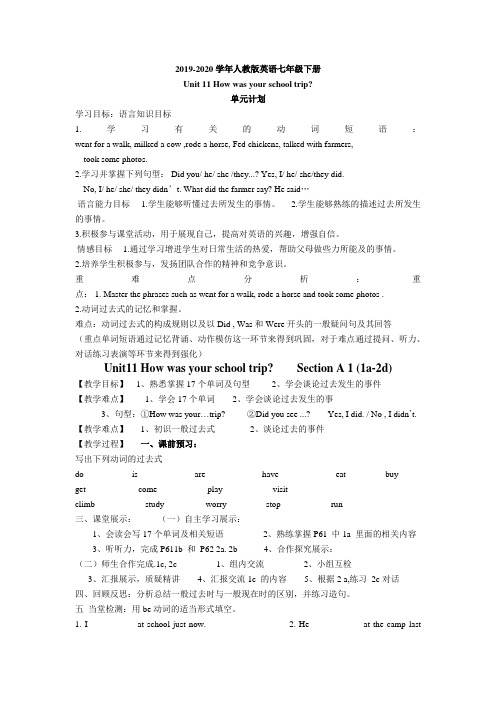
2019-2020学年人教版英语七年级下册Unit 11 How was your school trip?单元计划学习目标:语言知识目标1.学习有关的动词短语:went for a walk, milked a cow ,rode a horse, Fed chickens, talked with farmers,took some photos.2.学习并掌握下列句型: Did you/ he/ she /they...? Yes, I/ he/ she/they did.No, I/ he/ she/ they didn’t. What did the farmer say? He said…语言能力目标 1.学生能够听懂过去所发生的事情。
2.学生能够熟练的描述过去所发生的事情。
3.积极参与课堂活动,用于展现自己,提高对英语的兴趣,增强自信。
情感目标 1.通过学习增进学生对日常生活的热爱,帮助父母做些力所能及的事情。
2.培养学生积极参与,发扬团队合作的精神和竞争意识。
重难点分析:重点: 1. Master the phrases such as went for a walk, rode a horse and took some photos .2.动词过去式的记忆和掌握。
难点:动词过去式的构成规则以及以Did , Was 和 Were 开头的一般疑问句及其回答(重点单词短语通过记忆背诵、动作模仿这一环节来得到巩固,对于难点通过提问、听力、对话练习表演等环节来得到强化)Unit11 How was your school trip? Section A 1 (1a-2d)【教学目标】1、熟悉掌握17个单词及句型2、学会谈论过去发生的事件【教学难点】1、学会17个单词2、学会谈论过去发生的事3、句型:①How was your…trip? ②Did you see ...? Yes, I did. / No , I didn’t. 【教学难点】1、初识一般过去式2、谈论过去的事件【教学过程】一、课前预习:写出下列动词的过去式do______ is_______ are_______ have_______ eat____ buy_____ get______ come ______ play _____ visit______climb ______ study _____ worry_____ stop _____ run_____三、课堂展示:(一)自主学习展示:1、会读会写17个单词及相关短语2、熟练掌握P61 中1a 里面的相关内容3、听听力,完成P611b 和P62 2a. 2b4、合作探究展示:(二)师生合作完成.1c, 2c 1、组内交流2、小组互检3、汇报展示,质疑精讲4、汇报交流1c 的内容5、根据2 a,练习2c对话四、回顾反思:分析总结一般过去时与一般现在时的区别,并练习造句。
Unit11讲义人教版英语七年级下册
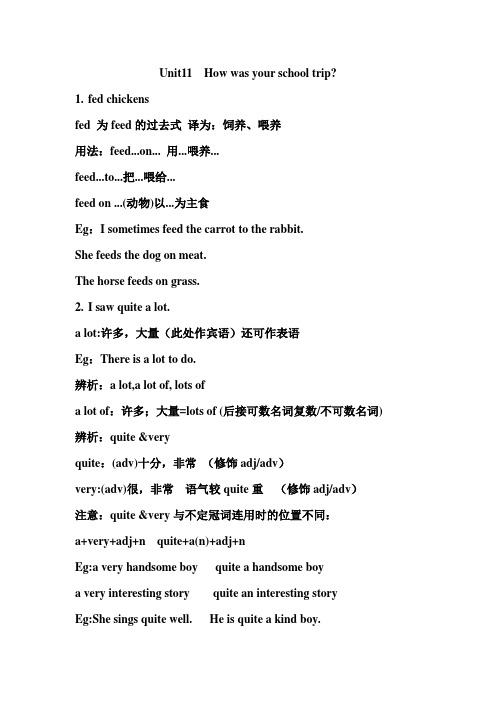
Unit11 How was your school trip?1.fed chickensfed 为feed的过去式译为:饲养、喂养用法:feed...on... 用...喂养...feed...to...把...喂给...feed on ...(动物)以...为主食Eg:I sometimes feed the carrot to the rabbit.She feeds the dog on meat.The horse feeds on grass.2.I saw quite a lot.a lot:许多,大量(此处作宾语)还可作表语Eg:There is a lot to do.辨析:a lot,a lot of, lots ofa lot of:许多;大量=lots of (后接可数名词复数/不可数名词) 辨析:quite &veryquite:(adv)十分,非常(修饰adj/adv)very:(adv)很,非常语气较quite重(修饰adj/adv)注意:quite &very与不定冠词连用时的位置不同:a+very+adj+n quite+a(n)+adj+nEg:a very handsome boy quite a handsome boya very interesting story quite an interesting storyEg:She sings quite well. He is quite a kind boy.This kind of fruit is very healthy. Thank you very much.3.Did you learn anything?辨析:anything&somethinganything:(不定代词)任何事物;某事物(常用于否定句/疑问句中) something:(不定代词)某事(常用于肯定句中) 但是在表示请求、建议、或征求意见的疑问句中常用something注意:(1)adj修饰不定代词,要位于其后(2)不定代词作主语时,谓语动词用单数形式(3)补充其他不定代词some any no every/body thing oneEg:There isn’t anything wrong.There is something wrong with my puter.4.The farmer showed Carol around the farm.farmer:(n)农民farm:(n)农场;(v)干农活farming:(不可数n)农事Eg:The farmers are working on the farm,and there is too much farming.show sb.around...带某人到处参观...Eg:The guide shows us around the museum.与show相关的短语:show sb.sth=show sth.to sb.给...看展示on show 展览show off 炫耀show up出现5.The farmers don’t grow apples.grow:(vt)种植;栽培(vi)生长;发育Eg:Farmers in the south of China mainly grow rice.Everything begins to grow in spring.短语:grow up成长,长大grow into成长为;发展成(由一种情况变成另外一种情况)Eg:I want to be a guide when I grow up.She grows into a lovely girl.辨析:grow&plantgrow: 种植(强调过程/状态)plant:(v)种植(仅表示栽入土中,表示动作)(n)植物Eg:The farmers grow a lot of trees every year.The farmers plant lots of trees every year.There are many different plants in the garden.6....we worried it would rain.worry:(vt)担心;担忧后常接宾语从句Eg:His parents worry that their child will sick.(vt)使担心;使发愁(常接sb.作宾语)Eg:The naughty boy worries his parents.worry about sb./sth.=be worried about sb./sth. 担心某人/某事Eg:Don’t worry about me ./Don’t be worried about me.7.Luckily,it didn’t,and the sun came out again.(1)luckily(adv)幸运地常用于句首,用逗号隔开unluckily不幸地unfortunately fortunate(adj)幸运的fortunately(adv)幸运地以辅音字母+y结尾的形容词变成副词的方法:改y为i再加ly Eg:happy lucky busy angry easy(2)sun moon earth star 都是世界上独一无二的事物,前面必须加the(3)e out出来;发芽;开花;出版与e相关的短语:e from来自 e on加油;快点 e back 回来e down 下来 e in 进来 e up with 提出;想出;赶上e across遇到8.expensive/cheapexpensive/cheap只能形容事物的贵贱;当谈论价格(price)时,只能用high/lowEg:The pen is cheap.=The price of the pen is low.9.All in all,it was an exciting day.all in all:总的来说;总之in a word:简言之in short:总之Eg:All in all, it’s good for you to do more exercise.辨析:all in all, in all,at allall in all:总的来说(常用于句首)eg:All in all, we had a good time. in all:总共;合计(句首/句末)eg:There are fifty students in all.at all:根本常用于“not at all”根本不Eg:He doesn’t like apples at all.与all相关的短语:all the time 一直after all 毕竟10.I didn’t like the trip at all.Not at all 用于回答感谢/道歉Eg:Thank you very much.Not at all.其它的回答:It’s my pleasure. It’s a pleasure. No problem.You’re wele. That’s all right. That’s OK.一般过去时态含义:表示过去某个时间发生的动作或存在的状态,也表示过去经常或反复发生的动作。
人教版九年级英语Unit11单词、课文知识梳理,词汇句式精讲

人教版九年级英语Unit11单词、课文知识梳理/词汇句式精讲Unit11 单词the more …the more…越……越……leave out不包括;不提及;忽略friendship[frendʃip]n. 友谊;友情king[kiŋ]n. 君主;国王prime[praim]adj. 首要的;基本的minister[ministə(r)]n. 大臣;部长prime minister首相;大臣fame[feim]n. 名声;声誉pale[peil]adj. 苍白的;灰白的queen[kwi:n]n. 王后;女王examine[igzæmin]v.(.仔细地)检查;检验nor[nɔ:(r)]conj. & adv. 也不neither ... nor既不⋯⋯也不palace[pæləs]n. 王宫;宫殿powern. 权利;力量wealth[welθ]n. 财富;富裕grey[grei]a.阴沉的;昏暗的;灰色的lemon[lemən]n.柠檬[kænsl]v. 取消;终止weight [weit]n. 重量;分量shoulder [ʃəuldə(r)] n. 肩;肩膀goal[gəul]n. 球门;射门;目标coach[kəutʃ]n. 教练;私人教师kick[kik]v. 踢;踹teammate[ti:meit]n. 同队队员;队友courage[kʌridʒ]n. 勇敢;勇气rather[ra: ]adv. 宁愿;相当rather than而不是pull[pul]v. 拉;拖pull together齐心协力;通力合作relief[rili:f]n. 轻松;解脱nod[nɔd]v. 点头agreement[ əgri:mənt]n. (意见或看法)一致;同意fault[fɔ:lt]n. 过失;缺点disappoint [disəpɔint] v. 使失望Bert[bə:(r)t]伯特(男名)Holly[hɔli ]霍莉(女名)Unit11 知识梳理【重点短语】1. make me sleepy 使我困倦2. drive sb. crazy 使……发疯3. the more…,the more 越……越……4. yes and no 好坏参半5. be friends with sb. 是某人的朋友6. feel left out 感觉被忽视7. sleep badly 睡眠很差8. don’t feel like eating 不想吃东西9. for no reason 毫无理由10. neither…nor…既不……也不……11. let …down 使…...失望12. take one’s position 替代我的职位13. to start with 起初14. get the exam result back 取考试成绩单15. find out 发现16. remain unhappy forever 仍旧永远不幸福17. a shirt of a happy person 一件快乐人的衬衫【重点句型】1. --I’d rather go to Blue Ocean because I like to listen to quiet music while I’m eating.--But that music make me sleepy.--更愿意到蓝海洋餐厅,因为我喜欢在吃饭时听轻音乐。
人教版九年级英语全册Unit11单元教学设计

4.教师引导学生关注课文中的成功人士故事,学习他们的成功经验。
-师:From the story, what qualities do you think are important for being successful?
2.学生快速阅读课文,教师提问检查学生对课文的理解。
-师:What's the main idea of the passage? Can you find out some key words and phrases about achieving goals?
3.教师详细讲解课文中的重点词汇和句型,如:achieve, goal, succeed, determination等,并通过示例句展示语法结构。
(三)学生小组讨论
1.教师将学生分成小组,让他们讨论以下问题:
- What are your goals for the future?
- How can you achieve your goals?
- Can you share some successful people's stories you know?
4.针对情感态度和价值观的培养,采用以下策略:
-结合课文内容,引导学生开展人生规划和目标设定的讨论,激发他们的梦想和激情。
-举办成长故事分享会,让学生从他人的经历中汲取正能量,培养积极向上的心态。
-开展公益活动,让学生在实际行动中体验助人为乐的价值观。
五年级上册英语教案-Unit11I’msorry|湘少版(三起)

五年级上册英语教案Unit 11 I’m sorry|湘少版(三起)教学内容本单元主要围绕“表达歉意”这一主题展开,通过一系列的对话和活动,让学生掌握在日常交流中如何恰当地使用“I'm sorry”这一表达方式。
教学内容包括:学习表达歉意的不同场景和语境,如不小心碰到别人、忘记某事、迟到等;掌握相关词汇和句型,如“Excuse me”、“I'm sorry”、“That's all right”等;了解道歉的文化差异。
教学目标1. 知识目标:学生能够理解并正确使用“I'm sorry”及相关句型。
2. 能力目标:学生能够在不同的情境中灵活运用道歉的表达方式,提高日常交流能力。
教学难点1. 语境理解:学生需要理解在不同情境下如何恰当地使用道歉的表达。
2. 文化差异:介绍不同文化背景下道歉的方式和习惯,帮助学生理解并尊重文化多样性。
教具学具准备1. 教材:五年级上册英语教科书。
2. 多媒体:PPT课件,包含相关图片和音频。
3. 卡片:词汇卡片,用于复习和游戏环节。
4. 角色扮演道具:根据不同场景准备相应的道具,如书本、帽子等。
1. 导入:通过图片或小故事引入道歉的主题。
2. 新授:展示并解释新词汇和句型,通过例句和情景模拟帮助学生理解。
3. 练习:进行小组练习,鼓励学生用新学的词汇和句型进行对话。
4. 巩固:通过角色扮演或游戏等方式巩固所学内容。
板书设计中心:单元主题“I'm sorry”左侧:列出重点词汇和句型右侧:展示不同的道歉场景和语境作业设计1. 书面作业:完成教科书上的相关练习题。
2. 口头作业:与家长或朋友进行角色扮演,练习道歉的表达。
3. 扩展作业:调查不同文化背景下道歉的方式,准备简短的报告。
课后反思本节课后,教师应反思教学效果,包括学生对新知识的掌握程度、课堂活动的参与度以及教学目标的达成情况。
同时,针对学生的反馈和表现,调整教学方法,为下一节课做好准备。
九年级英语全册《Unit 11 Could you please tell me w
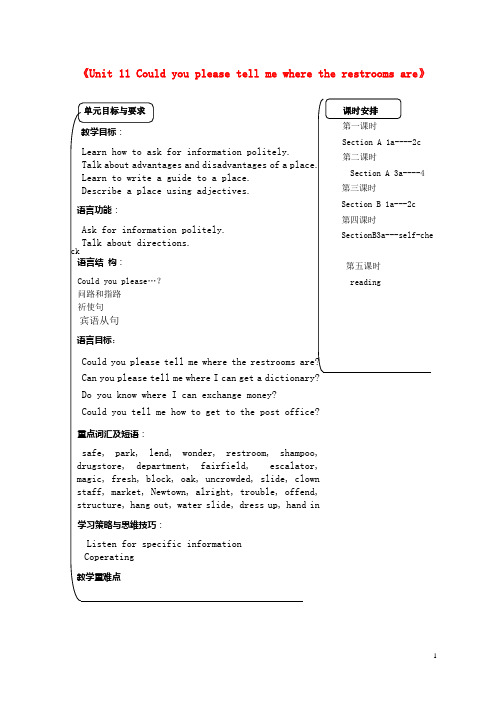
《Unit 11 Could you please tell me where the restrooms are》inPeriod 1Lin Yi●教学内容与分析❶教学内容:Section A 1a—2c❷教学目标:1. Knowledge Objects(1) Key Vocabularyrestroom, shampoo, stamp,escalator, furniture, exchange money, elevator(2) Target LanguageExcuse me. Can you please tell me where I can get a dictionary?Sure.There’s a bookstore on River Road.Take the escalator to the second floor and turn right. The bank is next to the bookstore.2. Ability Objects(1)Train students’ listening ability.(2)Train students’ communicative competence.3. Moral ObjectHelping each other is very important. It is a good quality.If someone asks you how to get to the place he wants to go to, you should tell him the way correctly.●教学重点、难点分析:Ⅱ. Teaching Key Point1. Key Vocabularyrestroom, shampoo, stamp,escalator, furniture, exchange money, elevator2. Target LanguageExcuse me. Do you know where I can exchange money?Sure.There’s a bank on the second floor.3. StructuresExcuse me. Can you please tell me where I can get a dictionary? Do you know where I can buy shampoo? Could you tell me how to get to the post office? Sure.There’s a bookstore on River Road.Take the escalator to the second floor and turn right. The bank is next to the bookstore.Ⅲ. Teaching Difficult Points1.How to train students’ listening ability.2.How to train students’ communicative competence.3. To learn to use Indirect questions and tell about places●Learning strategies: Listen for specific information, Cooperating●课前准备教学课件和录音机●教师设计教学步骤建议和说明Step1 Warm-up by learning new wordsHave a try. Where can we do these things?For example: Where can we take out money and save money?We can do it in a bank.Give students some phrases about doing things, and ask them to say 大脑风暴,打开学生思维。
八年级英语Unit 11 Could you please clean your room 人教版知

初二英语Unit 11 Could you please clean your room? 人教版【本讲教育信息】一. 教学内容:Unit 11 Could you please clean your room? 讲二. 语言目标:Make polite requests; Ask for permission三. 目标语言:-- Could you please sweep the floor? -- Yes, sure.四. 重、难点诠释:1. Could you please +原V ? 请你……好吗?表达一种礼貌的、委婉的请求。
其中could 是客气的表达方式,不是过去式,所以回答时不能用Yes, I could 。
可以用Yes, I can / Sure / No problem 、I ’d love to. / Of course. / OK 等回答。
否定回答则用Sorry, I can ’t 或I ’d love to, but …,并陈述理由。
ex:-- Could you please sweep the floor? -- Sure.2. Could I please …? 是用来询问对方,征求对方的许可,意思是“我做……可以吗?”其中的could 也是较客气的说法,可用can 或may 代替。
ex: --Could I use your puter? -- Yes, you can / may. Sorry, you _____________.-- _______ you give your notebook to me? -- Sorry, I ’m using it. 3.⎪⎪⎪⎩⎪⎪⎪⎨⎧?____________________?____________________?_______________________?____________________?____________________please you Could (打扫卫生)(做饭)(做家务)(洗衣服)(洗餐具)4. take out the trash 倒垃圾take out 是动副结构的短语,若宾语是代词,则置于两词中间。
Unit11 I'm sorry. (说课稿)湘少版 (三起)英语五年级上册

Unit11 I’m sorry说课目标•学习表达道歉的常用句子•了解文化差异中的道歉方式•提高语言交际能力,增强语感说课重点•掌握道歉句型的用法•学习在不同场景下的道歉方式•培养正确的意识与态度说课难点•学生对文化差异的理解和运用•学生对细节的把握和表达能力的提升课前准备•课件•录音设备•笔记本电脑•课前调研教学步骤Step1. 问候与引入(5分钟)老师向学生问好,引导学生用“I’m sorry”回答,“I’m sorry”在英语中有什么含义?为什么要说“sorry”?然后根据学生的回答,简要介绍今天的课程主题“Unit11 I’m sorry”。
Step2. 学习发音(10分钟)播放录音并引导学生模仿,练习重点句型和单词的发音,帮助学生克服口音。
Step3. 学习常见表达方式(20分钟)1.介绍常见的道歉方式,比如口头和书面道歉。
展示口头道歉和书面道歉的示例。
2.分组,展示不同场合下的道歉方式,例如教室、图书馆、餐厅等。
3.带领学生模拟这些场景并进行实践。
老师可以扮演角色,用不同的方式道歉,学生再进行模仿或提出合理的补充建议。
Step4. 创意练习(10分钟)要求学生分组制作海报,提示词汇:Sorry、I Apologize等。
海报要求清晰、有吸引力、语言表达得恰当,结合故事情节和颜色设计,能够引发听众的共鸣和思考。
Step5. 总结(5分钟)回过头来,再次回顾本节课的任务和目标,强调学生应该把握道歉的正确方式和态度。
课后练习•帮助学生把“sorry”这个单词制作成单词卡片并背诵。
•让学生思考自己在日常生活中需要道歉的场景,并练习如何表达。
•请学生以小组的方式整理一份关于“道歉”文化差异的PPT,并在下一次上课时进行分享。
授课思路本课的教学要求学生关注道歉的语言表达方式、文化差异和对他人的尊重,而不是单纯刻意的道歉。
在教授重点和难点内容时,教师应该让学生积极参与其中,从而调动学生的学习积极性。
unit 11 sad movies make me cry(第1-3课时)学案+教案
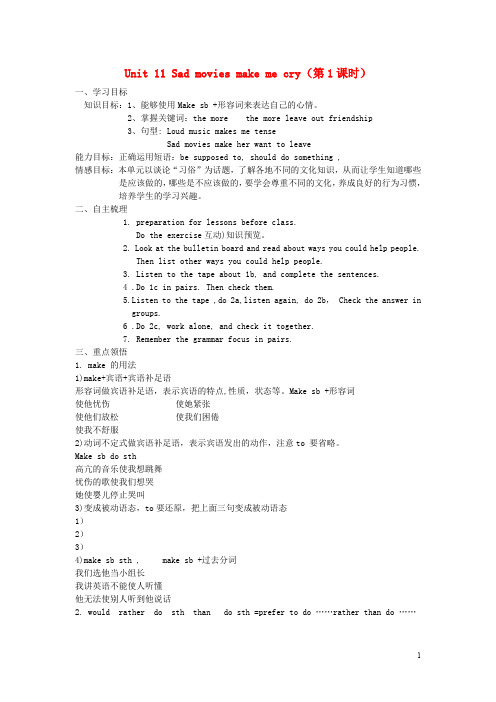
Unit 11 Sad movies make me cry(第1课时)一、学习目标知识目标:1、能够使用Make sb +形容词来表达自己的心情。
2、掌握关键词:the more the more leave out friendship3、句型: Loud music makes me tenseSad movies make her want to leave能力目标:正确运用短语:be supposed to, should do something ,情感目标:本单元以谈论“习俗”为话题,了解各地不同的文化知识,从而让学生知道哪些是应该做的,哪些是不应该做的,要学会尊重不同的文化,养成良好的行为习惯,培养学生的学习兴趣。
二、自主梳理1. preparation for lessons before class.Do the exercise互动)知识预览。
2. Look at the bulletin board and read about ways you could help people.Then list other ways you could help people.3. Listen to the tape about 1b, and complete the sentences.4 .Do 1c in pairs. Then check them.5.Listen to the tape ,do 2a,listen again, do 2b, Check the answer ingroups.6 .Do 2c, work alone, and check it together.7. Remember the grammar focus in pairs.三、重点领悟1. make 的用法1)make+宾语+宾语补足语形容词做宾语补足语,表示宾语的特点,性质,状态等。
七年级英语-Unit_11_What_do_you_think_of_game_shows?AlMUPw

Unit 11 What do you think of game shows?
一、教学目标
1、语言目标
◆掌握部分有关电视节目以及表示装饰的词汇,如:soap opera, sitcom, sports show, host, super,
agree, hair clip, key ring, belt, wallet etc.
◆What do you think of…?句式在不同人称中的使用及其几种不同的答语方式,并能简单陈述理由。
◆掌握运用love, like, don’t like, don’t mind, can’t stand恰当表达对有关事物的观点和态度。
2、能力目标
◆学会陈述自己的看法和意见。
◆学会谈论自己的喜好。
◆谈谈流行文化,了解各类电影和电视节目的名称。
二、教学重点、难点
1、重点
学习及掌握陈述自己的看法,意见及喜好的词汇和基本句型。
2、难点
正确运用What do you/does he/she think of…?及I love/like/don’t like/don’t mind/can’t stand ... He/She loves/l ikes/doesn’t like/doesn’t mind/can’t stand ...等句型结构来表达对客观事物的评价。
三.教学过程
Period One (section A 1a – 2c )。
英语人教版九年级全册Unit11 SectionA(3a-3c)

4.He’s always worried about being followed by others, so he cannot be free!
教
学
过
程
导学过程
学习过程
I. Review
1)一直等她让我很生气。
2)我宁愿待在家里也不愿去公园。
3)为什么不去看电影呢?
4)汶川在2008年发生了一场大地震。
5)我们在一起越多,我们就越开心。
II. Free talk
What can make you happy?
III.Reading
1. 3a Read the story and answer the questions.
Soft and quiet music makes me relaxed.
Money and fame don’t always make people happy.
She said that the sad movie made her feel like crying.
能够用英语描述事情对自己感情的影响,复习被动语态。
1) Can medicine help the ill king? Why or why not?
2) Why does power not make the prime minister happy?
3) Why does money not make the banker happy?
4) Why does fame not make the singer happy?
七年级英语上册 Unit 11 What time do you go to school同步讲解
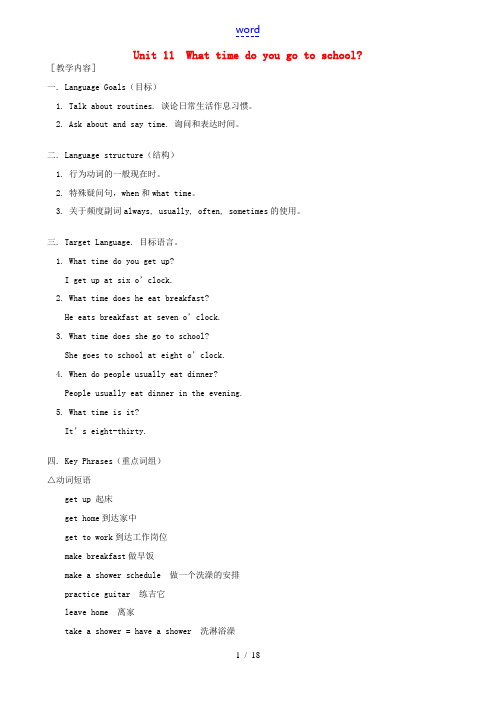
Unit 11 What time do you go to school? [教学内容]一. Language Goals(目标)1. Talk about routines. 谈论日常生活作息习惯。
2. Ask about and say time. 询问和表达时间。
二. Language structure(结构)1. 行为动词的一般现在时。
2. 特殊疑问句,when和what time。
3. 关于频度副词always, usually, often, sometimes的使用。
三. Target Language. 目标语言。
1. What time do you get up?I get up at six o’clock.2. What time does he eat breakfast?He eats breakfast at seven o’clock.3. What time does she go to school?She goes to school at eight o’clock.4. When do people usually eat dinner?People usually eat dinner in the evening.5. What time is it?It’s eight-thirty.四. Key Phrases(重点词组)△动词短语get up 起床get home到达家中get to work到达工作岗位make breakfast做早饭make a shower schedule 做一个洗澡的安排practice guitar 练吉它leave home 离家take a shower = have a shower 洗淋浴澡take the Number 17 bus to the Santon Hotel乘17路公共汽车去Santon 旅馆go to class 上课go to school 上学go to work 上班(反义词 go home)have breakfast/dinner/lunch 吃早、晚、午饭go to bed 睡觉(反义词get up)put on 穿衣服(反义词take off)do one’s homework 做家庭作业tell sb. about sth. 告诉某人某事know about sth. 知道某方面的情况love to do = like to do 喜欢干某事listen to the early morning news on radio听电台早间新闻watch the early morning news on TV看电视早间新闻△其他短语around six o’clock 六点左右in the morning 在早上in the afternoon 在下午in the evening 在晚上listen to 听…五. Key Points (疑难解析)1. What time is it? It’s …这是询问时间的惯用法,如:A: Excuse me. What time is it, please?请问几点了?B: It’s nine o’clock. 九点了。
英语七年级下册Unit11【重点短语+词法语法句法精讲】
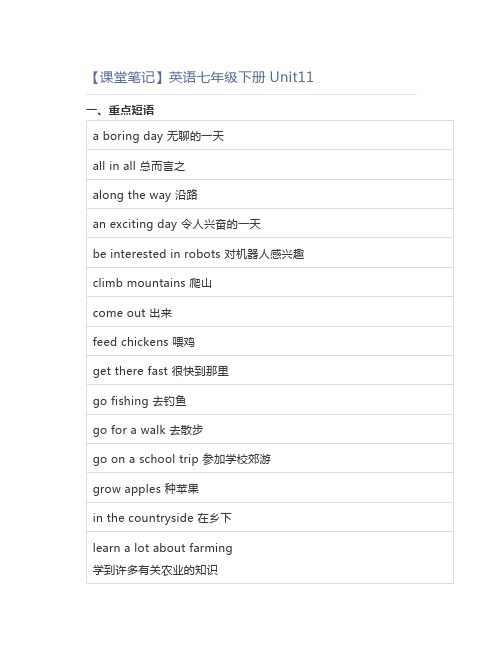
【课堂笔记】英语七年级下册Unit11一、重点短语二、重点句型1.—How was your school trip?你的学校郊游怎么样?—It was great/excellent!很棒!2.—What did you do yesterday?你昨天做了什么?—I went fishing yesterday.我昨天去钓鱼了。
3.—Did you learn anything?你学到一些东西了吗?—Yes, I did./No, I didn't.是的,我学到了。
/不,我没学到。
4.—Were the strawberries good?草莓好吗?—Yes, they were.好的。
5.Luckily, it didn't rain, and the sun came out again!幸运的是,天没有下雨,太阳又出来了!6.Then the guide taught us how to make a model robot.然后导游教我们如何制作机器人模型。
7.I went to the gift shop and bought some lovely gifts for my parents.我去了礼品店,给我的父母买了一些可爱的礼物。
.All in all, it was an exciting day.总的来说,这是令人兴奋的一天。
9.The rooms were really dark and it was difficult to take photos.房间里真的很暗,照片很难拍。
10.I couldn't really see or hear the guide.我真的无法看见导游也听不见他说的话。
三、词法精选1.go fishing 钓鱼go+v.ing 通常用来表示去进行某项活动。
如:go shopping 去购物, go swimming 去游泳, go boating 去划船, go skating 去滑冰。
Unit 11 Dates, months and seasons
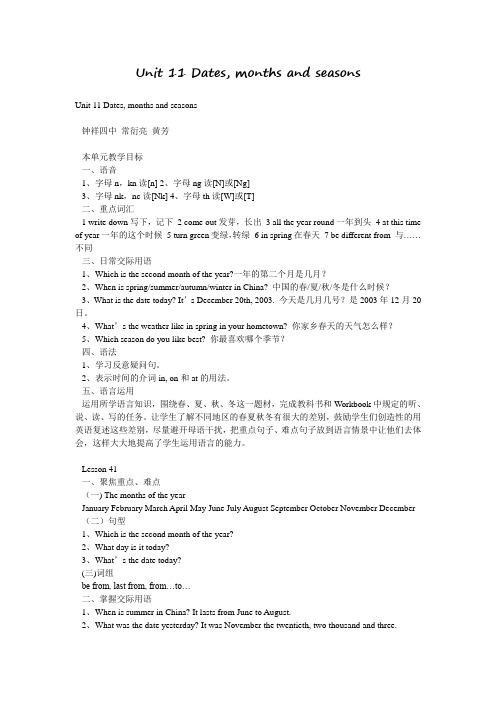
Unit 11 Dates, months and seasonsUnit 11 Dates, months and seasons钟祥四中常衍亮黄芳本单元教学目标一、语音1、字母n,kn读[n]2、字母ng读[N]或[Ng]3、字母nk,nc读[Nk]4、字母th读[W]或[T]二、重点词汇1 write down写下,记下2 come out发芽,长出3 all the year round一年到头4 at this time of year一年的这个时候5 turn green变绿,转绿6 in spring在春天7 be different from 与……不同三、日常交际用语1、Which is the second month of the year?一年的第二个月是几月?2、When is spring/summer/autumn/winter in China? 中国的春/夏/秋/冬是什么时候?3、What is the date today? It’s December 20th, 2003. 今天是几月几号?是2003年12月20日。
4、What’s the weather like in spring in your hometown? 你家乡春天的天气怎么样?5、Which season do you like best? 你最喜欢哪个季节?四、语法1、学习反意疑问句。
2、表示时间的介词in, on和at的用法。
五、语言运用运用所学语言知识,围绕春、夏、秋、冬这一题材,完成教科书和Workbook中规定的听、说、读、写的任务。
让学生了解不同地区的春夏秋冬有很大的差别,鼓励学生们创造性的用英语复述这些差别,尽量避开母语干扰,把重点句子、难点句子放到语言情景中让他们去体会,这样大大地提高了学生运用语言的能力。
Lesson 41一、聚焦重点、难点(一) The months of the yearJanuary February March April May June July August September October November December (二)句型1、Which is the second month of the year?2、What day is it today?3、What’s the date today?(三)词组be from, last from, from…to…二、掌握交际用语1、When is summer in China? It lasts from June to August.2、What was the date yesterday? It was November the twentieth, two thousand and three.三、教与学师生互动Step 1: Ask the students to answer the following questions likeWhat’s the date today?Step 2: ListeningI SB page 51, part 3 and request students to master how to answer the questions like: What day was it yesterday?Step 3: Practise the dialogue many times until most of the students can answer the questions correctly.四、课堂跟踪反馈(一)用括号所给单词的适当形式填空。
初二英语(人教版)教案Unit 11 Keep healthy
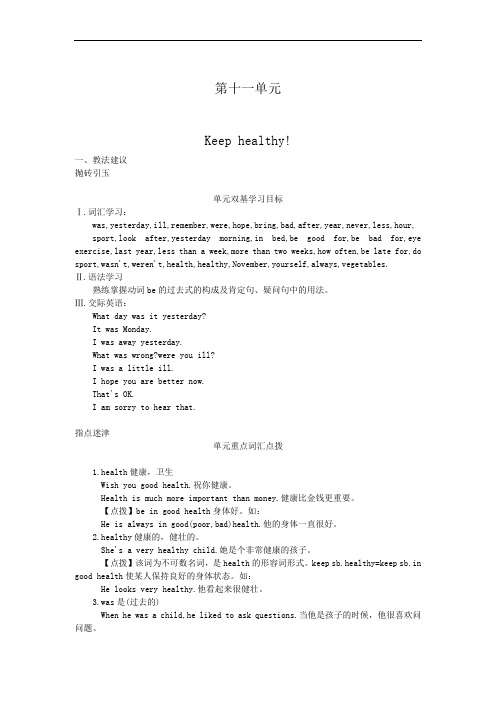
第十一单元Keep healthy!一、教法建议抛砖引玉单元双基学习目标Ⅰ.词汇学习:was,yesterday,ill,remember,were,hope,bring,bad,after,year,never,less,hour, sport,look after,yesterday morning,in bed,be good for,be bad for,eye exercise,last year,less than a week,more than two weeks,how often,be late for,do sport,wasn't,weren't,health,healthy,November,yourself,always,vegetables.Ⅱ.语法学习熟练掌握动词be的过去式的构成及肯定句、疑问句中的用法。
Ⅲ.交际英语:What day was it yesterday?It was Monday.I was away yesterday.What was wrong?were you ill?I was a little ill.I hope you are better now.That's OK.I am sorry to hear that.指点迷津单元重点词汇点拨1.health健康,卫生Wish you good health.祝你健康。
Health is much more important than money.健康比金钱更重要。
【点拨】be in good health身体好。
如:He is always in good(poor,bad)health.他的身体一直很好。
2.healthy健康的,健壮的。
She's a very healthy child.她是个非常健康的孩子。
【点拨】该词为不可数名词,是health的形容词形式。
人教版九年级英语Unit11说课稿
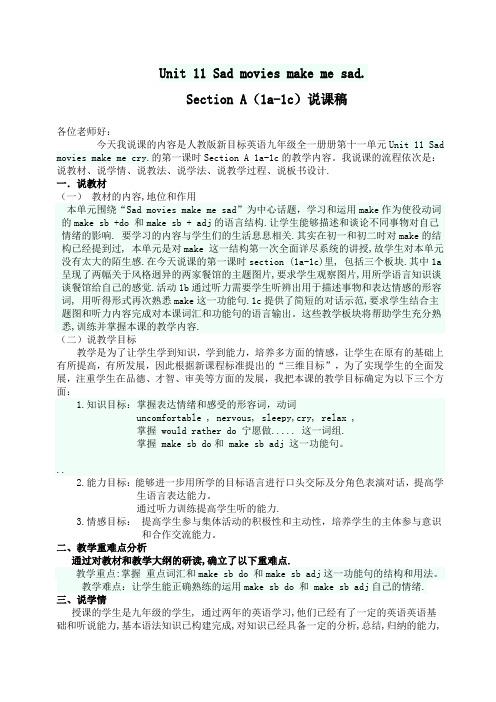
Unit 11 Sad movies make me sad.Section A(1a-1c)说课稿各位老师好:今天我说课的内容是人教版新目标英语九年级全一册册第十一单元Unit 11 Sad movies make me cry.的第一课时Section A 1a-1c的教学内容。
我说课的流程依次是:说教材、说学情、说教法、说学法、说教学过程、说板书设计.一.说教材(一)教材的内容,地位和作用本单元围绕“Sad movies make me sad”为中心话题,学习和运用make作为使役动词的make sb +do 和make sb + adj的语言结构.让学生能够描述和谈论不同事物对自己情绪的影响. 要学习的内容与学生们的生活息息相关.其实在初一和初二时对make的结构已经提到过, 本单元是对make 这一结构第一次全面详尽系统的讲授,故学生对本单元没有太大的陌生感.在今天说课的第一课时section (1a-1c)里, 包括三个板块.其中1a 呈现了两幅关于风格迥异的两家餐馆的主题图片,要求学生观察图片,用所学语言知识谈谈餐馆给自己的感觉.活动1b通过听力需要学生听辨出用于描述事物和表达情感的形容词, 用听得形式再次熟悉make这一功能句.1c提供了简短的对话示范,要求学生结合主题图和听力内容完成对本课词汇和功能句的语言输出。
这些教学板块将帮助学生充分熟悉,训练并掌握本课的教学内容.(二)说教学目标教学是为了让学生学到知识,学到能力,培养多方面的情感,让学生在原有的基础上有所提高,有所发展,因此根据新课程标准提出的“三维目标”,为了实现学生的全面发展,注重学生在品德、才智、审美等方面的发展,我把本课的教学目标确定为以下三个方面:1.知识目标:掌握表达情绪和感受的形容词,动词uncomfortable , nervous, sleepy,cry, relax ,掌握 would rather do 宁愿做..... 这一词组.掌握 make sb do和 make sb adj 这一功能句。
高中英语Unit11动词的语态语法考点超级归纳素材

Unit11 动词的语态考点一:主动语态与被动语态的转换语态(Voices)用来表示主语与谓语之间的关系,它是动词的一种形式。
英语中有两种语态:主动语态(Active Voice)和被动语态(Passive Voice)。
主动语态表示主语是动作的执行者,而被动语态表示主语是动作的承受者。
一般说来,只有及物动词才有被动语态。
be为助动词,有时态、人称和数的变化,其变化规则与系动词be相同。
主动语态转换为被动语态的步骤:先将主动句中的宾语变为被动句中的主语;再将主动句中的谓语动词变成被动形式;最后将主动句中的主语变为由by引起的短语并后置。
主动语态: Charles Dickens wrote this book.(主语)(谓语)(宾语)被动语态: This book was written by Charles Dickens.(主语)(谓语)(状语)注:将主动语态变为被动语态时,谓语动词的时态不变;主动句中作宾语的人称代词须变为主格,作主语的人称代词放在介词by后须变为宾格;by短语常省略。
主动语态转换成被动语态的几种情况:人给我买了一台He is known to be the best dentist注:用it作形式主语的被动语态句型还有:I t is said that… 据说……;It is reported that… 据报道……;It is believed that… 人们相信……;It is thought that… 人们认为……;It is well known that… 众所周知……等。
例如:It is said that this book has been translated into many languages in the world. 据说这本书已译成世界许多国家语言。
考点二:各种时态的被动语态被动语态由“be+过去分词”构成,不同时态的被动语态的差别在于be的不同时态形式。
- 1、下载文档前请自行甄别文档内容的完整性,平台不提供额外的编辑、内容补充、找答案等附加服务。
- 2、"仅部分预览"的文档,不可在线预览部分如存在完整性等问题,可反馈申请退款(可完整预览的文档不适用该条件!)。
- 3、如文档侵犯您的权益,请联系客服反馈,我们会尽快为您处理(人工客服工作时间:9:00-18:30)。
教学资源一、预习学案:见电子文档二、备课参考(红色标注为本单元释义)expression n.expression详见Unit 1 ◆ [C] & [U] 表达;表示freedom of expression 言论自由I sent them flowers as an expression of thanks. 我给他们送去鲜花表示感谢。
It’s better to give expression to your anger, rather than hiding it. 最好把你的愤怒表达出来,不要隐藏。
[C] 表情;神色The expression on her face is very friendly. 她脸上的表情很友好。
外研②–4I could tell from his expression that he was unhappy. 我从他的表情看出他不高兴了。
♦[C] 表达方法;措辞You can learn interesting words and expressions by reading poems. 通过阅读诗歌,你能学到有趣的词语和表达方法。
人教⑥–2⌧[U] 感情;表现力read / play with expression 有感情地朗读/ 表演standardn. [C] & [U] 标准;水准fix / set a standard制定标准the living standards 生活水平Standards of beauty change across time and cultural groups. 美的标准随着时间和文化群体的不同而有所差异。
北师大⑥–18adj.标准的standard English 规范的英语the standard size / time / unit 标准尺寸/ 时间/ 单位translatevt. & vi.◆翻译A lot of Tang poetry has been translated into English. 许多唐诗已被译成英文。
人教⑥–2 Most poetry doesn’t translate well. 大多数诗歌都翻译得不好。
(使) 转变;(使) 变为With effort, we can translate compassion into action. 通过努力,我们就可以把热情转化为行动。
accurate adj.准确的;精确的反inaccuratean accurate description / account / calculation 准确的描述/ 叙述/ 计算As his best friend, I can make accurate guesses about what he will do or think.作为他最好的朋友, 我能准确猜出他要做什么或想什么。
2008 上海fault n.◆ [C] 缺点;毛病;错误Everybody has some faults. 人皆有过。
The sweater had a fault in it and I had to take it back. 这件毛衣有瑕疵,我只好退货。
[U] (对错误所负的) 责任;过失;过错Why is everything always my fault? 为什么所有的事情都是我的过错呢?译林①–2 at fault 有责任;有错Perhaps the railway authorities are at fault for poor signaling system. 或许,铁路部门应该对糟糕的信号系统负责。
2011 浙江find fault (with) 找碴儿;抱怨;挑剔Try not to find fault with your friends. 不要挑剔你的朋友。
2012 辽宁► faultless adj.无错误的;完美无缺的点拨一:translate (产出词汇)考点复现The story was first written in English and later ________ (翻译) into Chinese. (2008 全国)答案: translated点拨二:fault (产出词汇)1. error, mistake, fault辨析error 是正式用语,侧重指计算、书写等过程中出现的“差错”以及计算机系统出现的错误,还可指道德上的错误。
常和介词in 搭配。
There must be an error in our calculations.我们在计算时肯定有差错。
The letter was sent to you in error.这封信误寄到你这里了。
mistake是普通用词,在日常英语中用得最为广泛。
着重强调因判断、理解及考虑不周造成的错误或误会。
常和介词by 搭配。
I picked up your bag by mistake.我错拿了你的包。
fault 指人性格上的弱点或行动上的“过失,过错”,往往强调其应负的责任。
用于物时指瑕疵、毛病。
It’s my fault that we missed the bus.我们错过了汽车是我的错。
For all its faults we love this city. 尽管有各种缺点,我们还是热爱这座城市。
2. 考点复现He is such a man who is always ________ fault with other people. A. putting B. seekingC. findingD. looking for“I don’t think it’s my________ that the TV blew up. I just turned it on, that’s all,” said the boy.A. errorB. mistakeC. faultD. duty答案: C Cperfect adj.◆完美的;极好的a perfect solution to the problem 解决问题的绝佳方法最适当的;理想的The weather was perfect for the outdoor performance. 天气很适合户外表演。
She is perfect for the job. 她做那项工作再合适不过了。
►perfection n. [U] 完美acquire vt.◆ (经过努力) 获得;学到The invention of the computer is a great achievement. 电脑的发明是一项了不起的成就。
Knowledge or skills can be acquired through exploration. 人们可以通过探索学到知识和技能。
2011 江西改 购得;得到How did the gallery come to acquire so many Picassos? 那个美术馆是如何得到如此多的毕加索画作的?communicate v◆vi.& vt.传递(信息);(与……) 通讯to exchange information or conversation with other peoplecommunicate information to sb 向某人传递信息People began to communicate with distant tribes. 人们开始和远处的部落通讯。
2006 江西E-mail is a tool which helps people all over the world to communicate conveniently. 电子邮件可以帮助全世界的人便捷地交流。
2010 陕西 vi. & vt. 传达to express your thoughts and feelings clearly to make them understoodA teacher must be able to communicate effectively to students. 教师必须能够有效地向学生传达思想。
You can communicate the power of enthusiasm to anyone who needs it. 你可以把热情的力量传达给每一个需要的人。
2010 江苏改♦vi.交流;沟通to let sb know your feelings and desires so that you can have a good relationshipMany couples make themselves miserable by not communicating. 许多夫妻因缺乏沟通而生活痛苦。
communicate with:He refused to communicate with others, even the family members. 他拒绝与他人交流,即使是家庭成员也不例外。
2010 重庆⌧vt. [常用于被动语态] 传染(疾病)The disease is communicated through dirty drinking water. 这种疾病通过不洁饮用水传染。
点拨三:perfect (产出词汇) excellent, outstanding, perfect, superb辨析四者都有“极好的”之意。
都没有比较级。
有时可互换。
Excellent is used especially about standards of service or of sth that sb has worked to produce. It is also used to show that you are very pleased about sth or that you approve of sth. He speaks excellent / perfect English.他讲一口地道的英语。
Outstanding is used especially about conditions or how suitable sth is for a purpose.an outstanding example of a 13th century castle 13世纪城堡的一个杰出范例Perfect is used especially about conditions or how suitable sth is for a purpose.The car is in perfect condition. 车况极佳。
